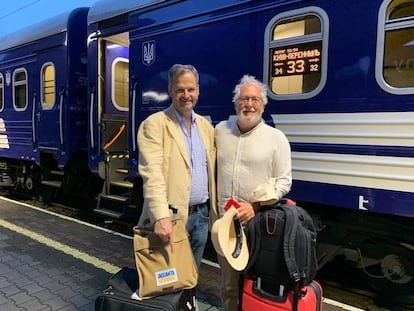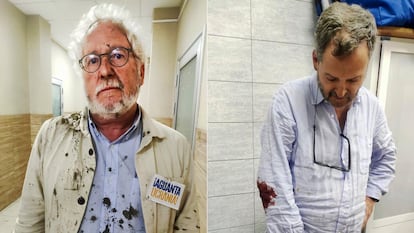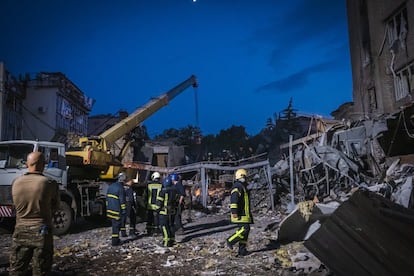Writer Héctor Abad survives Ukraine bombing: ‘We were having a laugh and suddenly found ourselves in hell’
At least 11 people died in a Russian attack on a restaurant in Kramatorsk, where Colombians on a solidarity mission were having dinner


Colombian writer Héctor Abad Faciolince arrived in Ukraine firmly believing that he had a new lease on life, a “rebirth” after his open-heart surgery 18 months ago. But everything changed one fateful evening. On June 27, a Russian bomb hit the restaurant where he was having dinner in Kramatorsk (Donetsk region), a city near one of the hottest war fronts. The attack has claimed the lives of 11 people, including three children, and left over 50 injured. Abad, who had traveled to Ukraine as part of a Colombian solidarity mission, told EL PAÍS how he was miraculously unscathed while Ukrainian writer Victoria Amelina battles for her life.
“An explosion jolted us like a bolt of lightning. Time seemed to slow down as everything fell around us,” Abad told us by phone as he traveled by car from eastern Ukraine to Kyiv, the nation’s capital. “My body was covered with dark splatters, so I thought I was injured, but I didn’t feel any pain. They say that when you’re hurt, sometimes there’s no pain. I stayed quiet. My ears were ringing – I still have it. People were screaming all around me from fear and pain. I somehow managed to stand up.”

Abad was at the popular Ria restaurant with Sergio Jaramillo, Colombia’s former peace commissioner, Colombian journalist Catalina Gómez, Ukrainian writer Victoria Amelina and a driver. They were lightheartedly bantering about the war-torn region’s evening curfew and alcohol ban. Amelina, who was sitting next to Abad, ordered a non-alcoholic beer. “We were trying to get some alcohol, having a laugh,” said Abad, “and suddenly found ourselves in hell. Catalina thought that I was injured because of the blood on me. ‘Forgive me for bringing you here,’ she said, as if she were to blame and not the Russians. Colombians always feel guilty about something.”
In all the chaos, they first thought Amelina was uninjured because she was still sitting in the same place. “I looked around and everyone seemed fine, except Victoria,” said Abad. “She was sitting upright, but very still, with no blood and her eyes closed – in the same position she was sitting when she ordered the beer. But she was very pale. Catalina and Sergio were talking to her, but she wasn’t responding. A Ukrainian man who thought I was injured pulled me out. I saw that Dima’s (the driver) car was destroyed, even though it had been parked a little ways from the restaurant. Strangely, the car was wrecked but we weren’t. I heard people crying out in Ukrainian. I wandered away, feeling lost... Everyone thought I was injured. Ambulances started to arrive. Sergio called out my name because they couldn’t find me, so I returned to the place where the missile fell.”

Amelina was quickly evacuated due to head injuries from shrapnel or fragments. Abad, Gómez, and Jaramillo were taken to Hospital Number Three in a private car, where Abad was treated for a thigh contusion. The hospital was chaotic. “People were screaming and running around, blood in the hallway, people kneeling over the wounded – it was a shocking scene… Victoria hadn’t been identified because Catalina had her purse. We showed her photo around and explained that she’s an important writer. After several hours, we went to our hotel, sad about Victoria and not understanding why we were okay and she wasn’t.”
Abad says he didn’t go to Ukraine as a writer or journalist, but to represent Colombia’s “Aguanta Ucrania” (Support Ukraine) campaign. After attending the Kyiv Book Fair over the weekend, he headed east to witness the devastation of the Russian invasion and personally express his solidarity to the Ukrainians there. In this war-ravaged region, Abad found himself grappling with questions he never thought he would have to ask himself.
A menorah in Kharkiv
“Earlier that day, we had spoken to a Ukrainian soldier who said he was a university student and a pacifist. But when the Russians invaded, he realized they only understood the language of force, and set aside his pacifism. I embrace pacifism to the core. I’m not brave – I had just flung myself to the ground after hearing an artillery blast. Yet, I agree with this soldier that certain circumstances in life oblige us to stand up to stronger, violent forces. I thought that the artillery blast, mortar, or whatever it was – I can’t tell the difference – would be my big war experience,” he said.
Abad’s head was spinning as he navigated the war-torn landscape and witnessed the devastation. “We had stopped at a monument with a menorah [the holy Jewish candelabrum] outside Kharkiv, a memorial to the tens of thousands of Jews killed [in World War II]. The Russians, who said they came to ‘denazify’ Ukraine, had wrecked the monument.”

“Everything has been very, very crazy.” Abad struggles to find the words to describe his experience. “We are stunned by the barbarity of a country that launches missiles into a place where dozens of civilians are talking and eating. What we didn’t expect to happen, happened. I can hardly sleep and I feel safer with every mile I put between myself and the hell created by the Russians in Donetsk… This mission of solidarity has suddenly become a tragic journey, and our colleague – Victoria Amelina – is battling for her life. We’re sad and devastated.”

In his novel, El olvido que seremos (Oblivion: A Memoir), Héctor Abad delves into the death of his father, a renowned doctor, professor and human rights activist who was murdered by Colombian paramilitaries in 1987. The shadow of that tragedy loomed again when he called his family after the bombing to let them know he was alive. “When I told my sisters, they said I was crazy, just like my father. What Sergio and I did here isn’t crazy. We just came to express our solidarity and encourage them to withstand this terrible aggression,” he said. “A friend told me I’m too old for these escapades. But I replied that I’ve seen women and people of all ages wounded and killed. There’s no age limit – it’s horrific. As I’m telling this, my head is hurting again – it feels like it’s going to explode. My ears are still buzzing and ringing unbearably, and I don’t know if I will ever see Victoria laughing again.”
The Colombian writer is coming home with some new insights from his brush with death. “All this is a resounding confirmation of what I already knew. You don’t have to travel far to see how the strong abuse the weak. I have seen it in person and in the injured Victoria, who wasn’t even going to come to Donetsk with us. She really liked our initiative at the Kyiv Book Fair and decided to join us. But this is like a spinning roulette wheel – some get hit and some don’t. It’s terrible to live in a world where these things happen, but we have to bear witness and oppose them.”
As the car takes Jaramillo and Abad away from that hell in Kramatorsk, an ambulance takes two women to a better equipped hospital in Dnipro. “The brave Catalina is with Victoria, holding her hand all the way. Catalina is the bravest one of us all.”
Sign up for our weekly newsletter to get more English-language news coverage from EL PAÍS USA Edition
Tu suscripción se está usando en otro dispositivo
¿Quieres añadir otro usuario a tu suscripción?
Si continúas leyendo en este dispositivo, no se podrá leer en el otro.
FlechaTu suscripción se está usando en otro dispositivo y solo puedes acceder a EL PAÍS desde un dispositivo a la vez.
Si quieres compartir tu cuenta, cambia tu suscripción a la modalidad Premium, así podrás añadir otro usuario. Cada uno accederá con su propia cuenta de email, lo que os permitirá personalizar vuestra experiencia en EL PAÍS.
¿Tienes una suscripción de empresa? Accede aquí para contratar más cuentas.
En el caso de no saber quién está usando tu cuenta, te recomendamos cambiar tu contraseña aquí.
Si decides continuar compartiendo tu cuenta, este mensaje se mostrará en tu dispositivo y en el de la otra persona que está usando tu cuenta de forma indefinida, afectando a tu experiencia de lectura. Puedes consultar aquí los términos y condiciones de la suscripción digital.








































